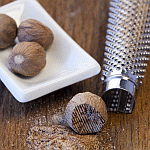
Hypothyreose - Schilddrüsenunterfunktion. Ein Fallbeispiel.
20.08.2017 | ADVERTORIAL | Bei einer Unterfunktion der Schilddrüse läuft der Stoffwechsel des Körpers langsamer ab als normal. Im Körper entsteht ein Mangel durch die Verminderung bestimmter Hormone. Lesen Sie das Fallbeispiel von Dr. Marianne Teitelbaum, wie man ayurvedisch den Mangel an Thyroxin (Thyroid) behandeln kann. Artikel in Englisch.
Titelbild: Foto von Lum3n von Pexels
Hypothyroidism: A Case History
by Dr. Marianne Teitelbaum
I am seeing rising epidemic levels of thyroid disorders every week in my practice. The high levels of stress we all experience on an ongoing basis are particularly draining for the endocrine system, especially the thyroid and adrenal glands. Ongoing stress weakens the endocrine system. In this article I want to address the thyroid gland primarily; however, I will be discussing the adrenal gland function as well, since whenever we are trying to balance the thyroid gland, it comes up.
The ancient doctors who cognized Ayurveda described six stages of a disease process. In the first two stages when an imbalance is developing, the body displays no symptoms yet. By the third and fourth stages visible and identifiable symptoms become apparent. And if you let these imbalances continue without addressing them, by the fifth and sixth stages you can develop a full-blown disease, which modern medicine can identify and name. By the fifth stage, it is harder to reverse already. The sixth stage is irreversible.
The goal of medicine, therefore, ideally, should be to detect these imbalances in the earlier stages thus preventing disease. Modern medicine places the most emphasis on diagnosing and treating disease when the symptoms are visible. With modern medicine, we detect and identify an ailment when it has already advanced to the fifth or even sixth stage, primarily because we do not have an understanding that can help us see and identify and understand things at earlier stages. Modern science monitors patients throughout their lives with bloodwork, scans, etc. and if/when they develop a disease, they administer medicines for suppressing or manage the symptoms of that disease. Identifying the underlying cause is not possible, because the system does not have the tools required for such understanding. And as Vaidya always reminded us, without isolating the underlying cause, it is impossible to correct and address an imbalance at all.
As you can guess, it is much easier to reverse imbalances, when we can identify them at their root, than it is to treat a disease. This is why, in SV Ayurveda, we devote much of our attention on preventing disease, rather than reacting to it. And this is particularly important in the treatment of thyroid dysfunction.
I see basically two types of thyroid problems in my practice. The first, and most common, is where I can easily detect thyroid malfunction yet the patient's thyroid hormones (TSH, T3, T4, thyroid antibodies, etc.) fall within the normal limits. The patient is usually riddled with symptoms of hypothyroidism.
The second scenario is where the thyroid hormones are low, and the doctor immediately prescribes thyroid medication, yet the patient presents to me still fully symptomatic, with continuing symptoms of thyroid imbalance even while on the prescribed medication: weight gain, hair loss, depression, swelling in the extremities, heartbeat arrhythmias, constipation, cold hands and feet, muscle cramping, and irregular menstrual cycles.
Let's discuss these two scenarios showing how best we can address them through SVA. In the first case, we address the thyroid even though the bloodwork shows no signs of problems. Remember, the patient is now in the 3rd and 4th stage of imbalance, distinct symptoms are there, yet in modern medical terms, it is not a condition that can be and should treated as an ailment.
In the second case, if the patient hasn't been on their prescribed thyroid hormone medication too long, we usually try to wean them off it, over several weeks' to months' time, as we address the malfunctioning thyroid. As we go through life, stress can weaken the glandular system and it can malfunction. So proper rest for the body is essential. Only when the body is getting proper rest can and do herbs help to strengthen the glands so they can regain their full function.
If you give medicines to the thyroid hormone immediately without trying to heal the imbalances, the thyroid gland will actually shut down. Keep in mind: the thyroid only produces its hormones when the levels of thyroid hormone are low. The hypothalamus releases thyroid stimulating hormone (TSH) to tell the thyroid to release its hormones. Thus, if the patient is taking the thyroid hormone, the thyroid gland can actually "go to sleep" since it is no longer needed to make the hormones. Thus, if the patient hasn't been on the hormones too long, they can actually be weaned off (as in this patient's case) while we address the thyroid.
How do we Address Thyroid Gland Imbalances through SVA?
First and foremost: proper rest! The patient must be instructed to go to bed no later than 10:00 p.m. I tell my patients to try to unwind at night. For this, I advise them not to engage in stimulating activities, to favor sitting quietly, perhaps reading, and to avoid computers, cell phones, long telephone conversations, loud jarring or emotionally stressful movies. If you allow your body to unwind, you will be surprised to find that you naturally fall asleep or start to feel like going to bed around 8:30 or 9:00 p.m.
The glandular system is like the battery we run on. It needs to be recharged. If we get that first signal of fatigue yet force ourselves to stay up longer and later, the endocrine system will kick in, releasing more adrenalin and cortisol to keep you awake. Then we get second wind and we keep going. But there is a big price to pay for this in the long run, because we are actually overexerting our glandular system, and weakening it. We will end up with fatigued adrenals, thyroid and reproductive glands.
So first thing to remember is: if you feel sleepy and tired around 8:30-9pm, don't ignore that impulse, go to bed. If you are used to going to bed (very) late, you have to slowly re-establish an early bedtime by going to bed earlier 15 minutes every night and waking up 15 minutes earlier every morning. The goal is to be awake either before or as the sun is rising, for optimum health. In fact, the ancient rishis said the body initially goes out of balance by either poor diet and/or late bedtime. Ayurveda clearly says that humans will experience optimal health when they are active when the sun goes up, and asleep when the sun goes down. Science is not oblivious to this detail. A study was conducted in which animals were exposed to glaring light disturbing them in their sleep at night. The animals confused the light for daytime, and they re-engaged in activity, staying awake later than they should. The result? It weakened their endocrine systems, and problems with ovulation and reproduction developed! The parallels that we can draw to the way the human physiology responds are very interesting to say the least.
So bedtime and rest is optimum if you want to balance your endocrine system.
Second, do not consume any soy products, as the isoflavones in the soy depresse thyroid function. This includes tofu, soy milk, and edamame - or any other prepared foods that may contain some form or other of soy.
What are the Best Herbs for the Thyroid?
Ashwagandha is one of the best herbs for both the thyroid and the adrenal glands, however, this herb carries "heating" properties in ayurvedic terms. This is why Vaidya Mishra recommended taking it transdermally or through his ingenious nectar drops. Ashwagandha cream can be applied to the lower spine twice a day. There are two strengths to the Ashwagandha drops. We use the less potent one (plain Ashwagandha drops) if the thyroid and/or adrenals are a little weak. We use the more potent one (Maha Ashwagandha drops) if the thyroid and adrenals are completely exhausted and the patient can barely function.
Shilajit (mineral pitch) is also great for the thyroid gland, yet it too is extremely heating in ayurvedic terms, and may give numerous reactions when taken, especially if the patient has high ranjaka pitta, or an overworked liver, which is nearly everyone these days!
The ancient rishis developed 6 formulas for women's thyroid and endocrine system using shilajit. In many cases, it was the first ingredient in the formula. Vaidya made a remedy called "Soma Shakti" based on the classical formula, however, he put the shilajit (also called "mineral pitch") as the last ingredient to prevent the overheating or overexertion of the liver. I like to use this remedy whenever possible. Unfortunately, most of my patients cannot handle it. So I rever to the milder nectar drops he made to replace Soma Shakti when the patient couldn't tolerate it. These two drops are "Shakti for Her" drops and "Multimineral Support Drops". Most patients respond very well to these.
The thyroid gland makes mostly T4, a hormone which has four iodines attached to tyrosine. However, the T4 has to be converted to the more active form T3, which the body can use. The conversion of T4 to T3 occurs in the liver and by the friendly bacteria in the gut. So you have to make sure liver function is good and there are plenty of thriving friendly bacteria in the gut. Having said that, I can honestly say that 99.9% of my patients need attention to both the liver and the gut, due to the high incidence of antibiotics, birth control pills and immunizations people have received over a lifetime - these, and numerous other medications, along with processed foods, creates malfunction in the liver and depletion of the friendly bacteria. If you read previous newsletters, you can find out how these two areas are easily treated with our protocols.
Also, for the conversion of T4 to T3, Vitamin D and Magnesium are necessary. We recommend both of these transdermally: Vitamin D taken orally can clog the bile in the gall bladder (because it is a highly fatty molecule) and can, over time, create a fatty sluggish liver. Vaidya makes Vitamin D Cream, Roll-on and Deoderant, so that it can be taken from the skin directly into the blood, bypassing the liver and gall bladder.
Magnesium shouldn't be taken orally for several reasons. When you take it orally, you automatically overdose, and the body has loose bowel movements to help you get rid of it. Also, magnesium, in its composition, is like shards of glass, and over time can create "striations" in the gut, damaging the gut lining. Vaidya always said it was best to give magnesium through the skin, transdermally. That is why he put together numerous remedies for taking magnesium: the lipid-based cream, the water-based roll-ons, or the massage oils. The best oil to use for the thyroid gland is Magnesium Oil with Ashwagandha. These oils can be used for daily self massage: warm the oil bottle slightly in your sink, pour into your plam, and apply onto your body starting with your extremeties (feet, hands, etc). Leave the oil on for 20 minutes, then shower off. You can leave it on if you prefer when the weather is hot, or it's summer time. Do not do a massage after sunset. Do not leave any oil on overnight. Do a self-massage with oil massages 3-7 times a week, depending on your time constraints. The benefits are countless.
Occasionally I see men with hypothyroid conditions. In this case, Vaidya made "Agni Shakti" tablets for them and the glyceride version is "Shakti for Him" drops.
This is the true "art" of practicing medicine. First, being able to identify the underlying problem or root cause, and then actually addressing the problem, not covering it up. Patients are always extremely grateful to find practitioners who practice in this truly holistic way, and we as practitioners, are extremely grateful to Vaidya Mishra, for his deep understanding of how to fix nearly everything in this modern day, always making variations on the ancient Ayurvedic formulas while still maintaining and not straying from the essence of the ancient texts. Thank you so much Vaidya. Your work will continue to live on through your adoring practitioners and their countless patients who will continue to receive relief from their suffering through your unique effective formulations.
Dr. Marianne Teitelbaum
Cinnaminson, New Jersey
To set up an in-person or over-the-phone SVA assessment with Dr. Teitelbaum, call: 1-856-786-3330
or
contact Vaidya Mishra Prana-Center:
Telefon: 001 - 818 - 709 - 1005
Email: info@prana-center.com
Website: www.vaidyamishra.com






.png)
.jpg)
.jpg)

